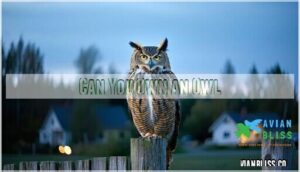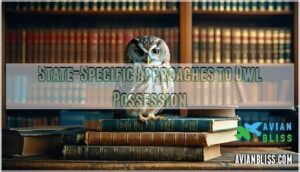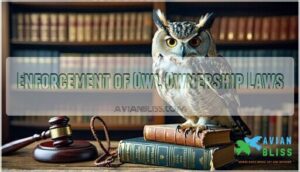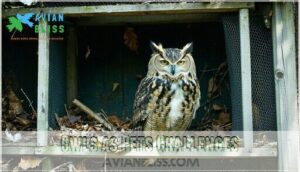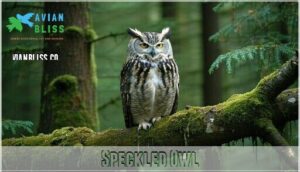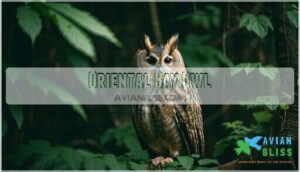This site is supported by our readers. We may earn a commission, at no cost to you, if you purchase through links.

Federal law protects all native North American owls under the Migratory Bird Treaty Act, making ownership illegal without special permits.
Only about fifteen states allow non-native owl species as pets, and even then, you’ll need proper licensing and meet strict requirements.
These birds aren’t like dogs or cats—they’re wild predators with complex needs including whole prey diets, massive flight spaces, and specialized veterinary care.
Most "pet" owls you see belong to licensed educators, rehabilitators, or falconers operating under strict regulations.
The legal landscape gets tricky when you dig into specific species and state laws, involving strict regulations and special permits.
Table Of Contents
- Key Takeaways
- Owls as Pets Overview
- Can You Own an Owl
- Owl Ownership Laws
- Getting an Owl Permit
- Owls as Pets Challenges
- Suitable Owl Species
- Owls in Captivity
- Alternatives to Owning an Owl
- Frequently Asked Questions (FAQs)
- Why is it harmful to keep an owl as a pet?
- What are the pros and cons of owning a pet owl?
- What are the challenges of keeping an owl as a pet?
- Can you legally have an owl as a pet?
- Is owl pet friendly?
- Can an owl be a house pet?
- What states allow owls as pets?
- Are owls friendly to humans?
- What kind of owl can you have as a pet?
- Can owls be trained to perform tricks?
- Conclusion
Key Takeaways
- You can’t legally own native owls – Federal law protects all North American owl species under the Migratory Bird Treaty Act, making possession without special permits illegal and punishable by up to $15,000 in fines.
- Only 15 states allow non-native owls with permits – Even then, you’ll need extensive licensing, proper facilities, and legitimate educational or rehabilitation purposes rather than companionship.
- Owls aren’t suitable pets – They’re wild predators requiring whole prey diets, massive flight spaces, specialized veterinary care, and they don’t bond with humans like traditional pets.
- Consider alternatives instead – Support owl conservation, volunteer at wildlife rehabilitation centers, or participate in educational programs to connect with owls legally and meaningfully.
Owls as Pets Overview
You might wonder if you can legally keep an owl as a pet, but the answer isn’t straightforward due to complex federal and state regulations.
Most owl species are protected under federal law, making ownership illegal without proper permits that aren’t issued for typical pet ownership, which involves complex regulations.
Legal and Regulatory Framework
The legal landscape for owl ownership resembles a complex maze where Federal Protections under the Migratory Bird Treaty Act clash with varying State Regulations.
You’ll navigate through strict Permit Types that determine Ownership Legality, while Enforcement Variances create confusion across jurisdictions.
- Federal law prohibits native owl ownership through US regulations protecting migratory species
- State regulations vary dramatically, with some allowing non-native species under specific permits
- Enforcement differs substantially between jurisdictions, creating legal gray areas for potential owners
Types of Owls and Their Suitability
Different owl species present varying challenges for potential owners, making most unsuitable as pets.
Barn owls, great horned owls, and snowy owls represent common species people consider, but their Owl Temperaments remain wild and unpredictable.
These owl breeds require massive Enclosure Needs, specialized Dietary Differences, and possess different Species Lifespans ranging from seven to twenty-five years.
Their Training Potential stays extremely limited compared to traditional pets.
Permits and Legal Requirements
Getting owl pet permits involves traversing complex owl legality requirements across different jurisdictions.
The permit application process demands extensive documentation, while justification requirements vary by state’s owl permit states regulations.
Here’s what you’ll face during the owl pet license journey:
- Facility inspections guarantee proper housing meets wildlife standards
- Ownership restrictions limit possession to education or rehabilitation purposes
- Interstate transport requires additional federal permits for crossing state lines
- Ongoing compliance includes regular reporting and veterinary oversight
Most owl legal states won’t approve permits for companionship alone, making traditional pet ownership nearly impossible under current owl pet legality frameworks.
Can You Own an Owl
You can’t legally own an owl as a pet in most places due to federal and state regulations that protect these wild birds.
Most owl species remain legally off-limits for personal ownership, protected by strict federal wildlife laws.
However, fifteen states do allow ownership of specific non-native owl species with proper permits and legal justification, which can enable ownership in certain circumstances.
States Where Owl Ownership is Legal
Fifteen states permit owl ownership with legal justification, though permit restrictions vary substantially.
You’ll find state variations create ownership loopholes for non-native owls in specific circumstances.
Statespecific laws in owl legal states focus on conservation rather than companionship.
Most owl permit states require specialized facilities and documented experience with raptors.
| State | Owl Pet Legality | Requirements |
|---|---|---|
| Alabama | Limited species only | American kestrel exclusively |
| Texas | Non-native permitted | Danger-based assessment |
| Nevada | Captive-bred allowed | Facility inspections required |
| Minnesota | Educational purposes | Proof of experience needed |
| Florida | Permit required | Annual compliance monitoring |
Federal Law and Regulations
Federal owl federal law creates a complex web you can’t ignore. The Migratory Bird Treaty Act (MBTA) Overview prohibits owning native owls without permits, while USFWS Authority enforces these federal regulations strictly.
- Federal Penalties reach $15,000 fines plus six months jail per bird
- Interstate Transport requires valid permits crossing state lines
- Treaty Protections cover all 1,000+ native bird species including owls
- US Fish and Wildlife Service doesn’t issue personal pet permits
- Federal prohibition applies regardless of state laws permitting ownership
Non-Native Owl Species Ownership
While native owls remain off-limits under federal laws, you can explore exotic pets like certain nonnative owls in specific states.
Import regulations vary substantially, with CITES controlling international trade. Species availability depends on owl state regulations and permit costs, which can exceed thousands.
Owl legal requirements differ for non-native species, though owl federal laws still apply. Consider ethical considerations and long-term impact before pursuing ownership.
Some regions feature unique bird species that might be available as pets, taking into account permit costs and the fact that these are exotic pets.
Owl Ownership Laws
You’ll encounter a complex web of federal and state laws that strictly regulate owl ownership, with most attempts to keep these birds as pets being illegal.
Understanding these regulations is essential since violations can result in hefty fines and even jail time under wildlife protection laws.
Migratory Bird Treaty Act
You can’t just pick up an owl from a pet store because the Migratory Bird Treaty Act of 1918 makes owning native North American owls illegal.
This federal law protects over 1,000 bird species, including all owl species found in North America.
The U.S. Fish and Wildlife Service enforces these owl restrictions strictly, with violations carrying fines up to $15,000 and potential jail time for strictly enforced laws.
State-Specific Approaches to Owl Possession
Each state takes its own approach to owl pet legality, creating a patchwork of regulations.
While federal alignment prohibits native species everywhere, permit variations exist for non-native owls:
- Permissive states allow non-native species with proper permits
- Restrictive states ban all owl ownership outright
- Selective states limit ownership to specific species only
- Conditional states require extensive safety and environmental assessments
These ownership requirements guarantee protected wildlife stays safe while giving some flexibility.
Owls also require specialized handling skills due to their sharp talons.
Enforcement of Owl Ownership Laws
Enforcement varies wildly across jurisdictions.
You might face owl fines up to $15,000 and owl jail time for illegal possession under federal enforcement.
State penalties differ dramatically – some areas rarely prosecute while others crack down hard.
Reporting violations happens through wildlife hotlines or local authorities.
International trade violations bring additional CITES penalties, making owl pet restrictions a serious legal maze you don’t want to navigate blindfolded.
Getting an Owl Permit
If you’re serious about legally owning an owl, you’ll need to navigate the complex permit system that governs these protected birds.
The three main permit types—educational, rehabilitation, and breeding—each serve specific conservation purposes and require extensive documentation, experience, and proper facilities to obtain.
Educational Permit
Educational permits let you keep owls for public display and biology education, not personal companionship.
Your permit application must prove expertise and meet strict facility requirements. You’ll demonstrate educational purpose through school programs or wildlife demonstrations.
Educational exhibition permits require detailed care plans, professional references, and periodic inspections. This educational permit pathway focuses specifically on owl education and conservation awareness programs.
Rehabilitation Permit
Rehabilitation permits authorize temporary owl possession for injury recovery and release back to the wild.
You’ll need extensive wildlife care expertise and approved facilities that meet strict standards for permit acquisition.
Requirements include:
- Facility standards meeting enclosure, diet, and health care specifications
- Veterinary consultant access for proper medical treatment
- Wildlife rehabilitation experience with raptors and owl welfare
- Release criteria knowledge for successful reintroduction
- Reporting requirements and regular inspections by authorities
Unlike educational permits, owl rehabilitation focuses purely on healing injured birds, not long-term possession.
Breeding Permit
Why pursue an owl breeding permit when you can’t just buy these birds like parrots?
Breeding permits authorize qualified individuals to propagate specific owl species under strict captive breeding regulations. You’ll need expertise in genetic diversity management and species conservation protocols.
These permits focus on ethical considerations for conservation projects, not pet owl legality. Breeding regulations require detailed offspring tracking and facility inspections.
Owls as Pets Challenges
Even with proper permits, owning an owl presents serious challenges that most people aren’t prepared for.
These wild predators have complex needs that differ drastically from traditional pets, requiring specialized knowledge and facilities that can cost thousands of dollars annually.
Specific Care Requirements
Owning an owl isn’t like caring for your average pet—these nocturnal hunters demand daily specialized care that’ll challenge even experienced bird keepers.
Their sensitive hearing means you’ll need quiet environments, and they rarely bond with humans despite years of interaction. You may need to use an avian vet locator to find a qualified professional.
- Veterinary Care: Finding qualified avian vets who understand owl physiology proves difficult and expensive
- Enrichment Activities: Complex prey-hunting simulations required to prevent destructive behaviors like feather-plucking
- Handling Techniques: Protective equipment essential due to sharp talons and defensive aggression
Diet and Enclosure Size
Your owl’s daily menu can’t include kibble or birdseed. You’ll need whole prey like mice, rats, and chicks to meet their nutritional needs.
Feeding frequency typically involves one meal daily, though prey variety matters for balanced nutrition. Many owners find it convenient to purchase frozen rodents for their owls.
Space requirements demand enclosures measuring at least 10x10x8 feet with flight room and perches. Your owl cage size directly impacts their well-being.
Enclosure enrichment helps prevent boredom, while hygiene needs include managing regurgitated pellets and specialized waste cleanup systems.
Handling and Safety Precautions
Handling owls isn’t like picking up your cat—these raptors pack serious weapons.
Think twice before reaching for that feathered predator—those talons aren’t just for show.
Even experienced handlers face real owl pet dangers that can send you to the emergency room.
Key owl safety concerns include:
- Sharp talons cause deep puncture wounds requiring immediate medical attention
- Powerful beaks deliver crushing bites that easily break skin and bones
- Defensive behaviors trigger aggressive attacks around unfamiliar people or pets
- Zoonotic diseases spread through contact, creating public safety risks
- Disrupted sleep cycles from handling cause chronic stress and behavioral problems
Safe handling requires protective gear, specialized training, and constant vigilance for injury prevention.
Protective gear like specialized owl gloves are essential for safety.
Suitable Owl Species
If you’re considering which owl species might be suitable as pets, you’ll find that even the most "pet-friendly" owls come with serious challenges.
While species like barn owls, speckled owls, and northern saw-whet owls are sometimes kept in captivity, they’re wild predators that require specialized care, proper permits, and facilities most people can’t provide.
Barn Owl
Among commonly permitted owl species, the Barn Owl stands out for captive breeding programs.
These nocturnal hunters need specialized barn owl diet consisting of rodents and birds.
Their calm temperament makes them suitable for experienced handlers, though owning an owl requires extensive permits.
Habitat enrichment mimics wild conditions, supporting owl conservation efforts.
Despite their adaptability, are owls pets? Not really—owl pet ownership remains heavily regulated.
Speckled Owl
The Speckled Owl, also known as the Spotted Owl, presents unique challenges for potential owl as pet enthusiasts.
This medium-sized raptor’s "Near Threatened" conservation status makes Speckled Owl legality extremely restrictive across all owl pet legal states and owl pet illegal states alike.
Here are key considerations for Speckled Owl care:
- Speckled Owl size requirements include specialized avian enclosures up to 45 cm in length
- Speckled Owl diet consists of small mammals like mice and voles with varied supplements
- Speckled Owl habitat needs mirror dense forest conditions with minimal human disturbance
- Speckled Owl permit states typically restrict possession to accredited rehabilitation programs only
Oriental Bay Owl
The Oriental Bay Owl stands out as a compact raptor species occasionally found in non-U.S. captive breeding programs.
Bay Owl Habitat requirements include densely vegetated enclosures mimicking their natural forest environment. Captive Bay Owls need specialized care with nocturnal schedules and low-stress housing.
Their Bay Owl Diet consists primarily of insects and small vertebrates, making feeding challenging for pet owl enthusiasts. Bay Owl Behavior shows secretive, shy tendencies requiring minimal disturbance.
They’re similar in size to the northern hawk owl, though that species isn’t typically kept as a pet. Bay Owl Conservation efforts restrict Oriental Bay Owl ownership to licensed facilities rather than private owl ownership situations.
Mountain Scops Owl
The Mountain Scops Owl presents unique temperament traits that make owl ownership exceptionally challenging.
This tiny species requires specialized housing needs with densely vegetated enclosures to reduce stress.
Their captive behavior remains secretive and shy, making handling ease nearly impossible for inexperienced owners.
The Scops diet consists primarily of insects and small amphibians, demanding varied meal planning.
Legal restrictions severely limit owl permits for private ownership, which can be a significant challenge due to legal restrictions.
Northern Saw-Whet Owl
The Northern SawWhet Owl ranks as North America’s smallest owl species, measuring just 6.7 to 8.7 inches with quiet nature making them seem like ideal owl pets.
However, owl wild animals face strict owl pet regulations under federal law.
These tiny predators require specialized care despite their calm temperament.
With a captive lifespan of 7-16 years, they cost $150-200 but owl legality remains complex across states.
Owls in Captivity
When you keep an owl in captivity, you’re not creating a pet relationship like you’d with a dog or cat.
Instead, you’re participating in carefully regulated programs that prioritize the bird’s welfare and conservation needs above personal companionship, which is a key aspect of conservation needs.
Conservation and Education Goals
When you’re legally authorized to keep an owl, it’s never about having a pet—it’s about advancing owl conservation and species preservation.
Educational institutions use these magnificent birds to spark public awareness about habitat protection.
Wildlife conservation programs rely on captive owls to teach visitors about ecosystem balance and threats facing wild populations.
Your owl becomes an ambassador for its species, helping people understand why wildlife education programs matter.
To further these efforts, consider supporting community engagement efforts focused on local bird populations.
These conservation goals transform owl ownership from personal desire into meaningful environmental action that benefits entire ecosystems.
Falconry and Rehabilitation Requirements
How do you pursue falconry or wildlife rehabilitation legally? Both paths demand rigorous training and unwavering commitment to proper animal care.
Falconry Requirements:
- Falconry Exams – Pass written tests covering raptor biology, hunting techniques, and regulations before earning your apprentice license
- Apprentice Mandates – Complete two years under an experienced falconer’s guidance, learning hands-on falconry training and wildlife rehabilitation techniques
- Regular Inspections – Submit to ongoing facility checks and reporting requirements to maintain your falconry regulations compliance
Rehabilitation Pathway:
- Rehab Facilities – Maintain specialized enclosures meeting strict standards for injured owl recovery and care
- Veterinary Oversight – Work with licensed vets experienced in raptor medicine for proper wildlife rehabilitation permits
- Facility Standards – Meet rigorous space, safety, and equipment requirements for successful owl rehabilitation programs
Both falconry and wildlife rehabilitation require federal and state authorization, extensive facilities, and ongoing regulatory compliance rather than simple pet ownership.
Distinguishing Legal Possession From Pet Ownership
Unlike traditional pet ownership, legal possession of owls serves conservation intent rather than companionship.
The US Fish and Wildlife Administration enforces strict regulatory differences, requiring specialized knowledge and training requirements.
Wildlife laws mandate that legally possessed owls remain government property, not personal pets.
You can’t simply decide legality based on affection—these birds exist for education, rehabilitation, or research purposes only.
Alternatives to Owning an Owl
If you can’t legally keep an owl as a pet, you still have meaningful ways to connect with these fascinating birds.
Consider supporting conservation organizations, volunteering at wildlife rehabilitation centers, or participating in educational programs that let you observe owls up close while contributing to their protection and care.
This approach allows you to contribute to the protection and well-being of owls, even if you cannot have one as a pet.
Supporting Owl Conservation Efforts
Beyond the dream of owl ownership lies meaningful bird conservation work.
You can support habitat preservation projects, reduce pesticide use in your yard, and fund owl research initiatives.
Wildlife conservation organizations need donations for owl stewardship programs.
Promote public awareness through social media or join responsible tourism activities that benefit owl populations, contributing to owl conservation.
Volunteering at Wildlife Rehabilitation Centers
Many wildlife rehabilitation centers welcome volunteers to help with owl conservation efforts and wildlife care.
You’ll handle owl care tasks like preparing diets, cleaning enclosures, and assisting with medical treatments.
Most centers require basic training before you start – no prior rehab experience needed for entry-level volunteer benefits.
Finding centers near you is easy through state wildlife agencies or online directories focused on owl stewardship and wildlife rehabilitation centers.
Learning About Owls Through Educational Programs
Educational wildlife programs offer you hands-on owl experiences without ownership responsibilities.
You’ll discover owl biology, behavior, and conservation needs through interactive demonstrations at wildlife centers.
These programs feature live owls used for educational purposes, guided by experienced owl falconers and educators.
You’ll gain conservation awareness while supporting responsible stewardship through public engagement with these magnificent raptors.
Frequently Asked Questions (FAQs)
Why is it harmful to keep an owl as a pet?
Like caging a thunderstorm, keeping owls as pets strips away their wild essence.
You’ll face aggressive behaviors, specialized diets requiring live prey, nocturnal disruptions, and complex housing needs that domesticated animals simply don’t have, making it a challenging task to care for them properly with their wild nature.
What are the pros and cons of owning a pet owl?
Owning a pet owl offers unique companionship but brings serious challenges.
You’ll face strict legal restrictions, expensive permits, specialized veterinary care, nocturnal disruption, and demanding dietary needs requiring live prey daily, which includes nocturnal disruption.
What are the challenges of keeping an owl as a pet?
Despite thinking owls look cuddly, you’ll face serious challenges: they need live prey daily, require massive flight spaces, stay awake all night making noise, and aren’t affectionate like traditional pets.
Can you legally have an owl as a pet?
You can’t legally keep native owls as pets due to the Migratory Bird Treaty Act. Some states allow non-native owls with permits, but regulations are strict and require specialized facilities.
Is owl pet friendly?
Owls aren’t pet-friendly companions despite their adorable appearance. They’re wild predators requiring specialized care, large enclosures, live prey diets, and nocturnal schedules that don’t mesh with typical household routines.
Can an owl be a house pet?
You can’t legally keep an owl as a house pet in most places. Federal laws protect native owls, and they’re wild predators requiring specialized care, permits, and facilities.
What states allow owls as pets?
Ironically, you’ll find more freedom in prison than owning an owl legally.
Fifteen states permit non-native owls: Alabama, Arkansas, Delaware, Kentucky, Louisiana, Minnesota, Montana, Nebraska, Nevada, North Dakota, Oklahoma, Rhode Island, South Carolina, South Dakota, and Tennessee.
This is a list of states that allow non-native owls.
Are owls friendly to humans?
Wild owls aren’t naturally friendly to humans.
They’re solitary predators that view people as potential threats.
Even captive-raised owls remain unpredictable and can become aggressive during breeding seasons or when stressed.
What kind of owl can you have as a pet?
Only fifteen states allow non-native owl ownership with permits.
Barn owls, speckled owls, and northern saw-whet owls are most commonly kept.
You’ll need specialized facilities, veterinary care, and proper licensing before considering these wild predators as companions.
Can owls be trained to perform tricks?
You can’t truly train owls like dogs or cats. They’re wild predators with instincts, not domesticated animals. While they might learn basic routines, complex tricks aren’t possible.
Conclusion
Realistically, you can’t have an owl as a pet in most situations across America.
Federal laws protect native species, and only fifteen states permit non-native owls under strict licensing.
These aren’t cuddly companions—they’re wild predators requiring specialized care, whole prey diets, and massive flight spaces.
Most "pet" owls actually belong to licensed educators or falconers.
Before pursuing owl ownership, research your state’s specific regulations and consider supporting owl conservation efforts instead.

